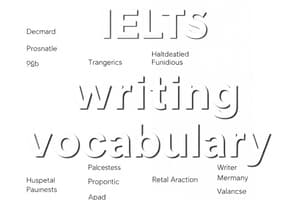Podcast
Questions and Answers
What is one of the four things you are scored on in IELTS Academic Writing Task 1?
What is one of the four things you are scored on in IELTS Academic Writing Task 1?
What is the level of vocabulary required to achieve an IELTS score of 6?
What is the level of vocabulary required to achieve an IELTS score of 6?
What is a trend in a graph?
What is a trend in a graph?
What is an example of a verb form for describing an upward trend?
What is an example of a verb form for describing an upward trend?
Signup and view all the answers
What is an example of a noun form for describing a downward trend?
What is an example of a noun form for describing a downward trend?
Signup and view all the answers
What is an example of a verb form for describing a trend that stays the same?
What is an example of a verb form for describing a trend that stays the same?
Signup and view all the answers
What is an example of an adverb of intensity for describing a downward trend?
What is an example of an adverb of intensity for describing a downward trend?
Signup and view all the answers
Why is it important to use a range of vocabulary when describing trends in graphs?
Why is it important to use a range of vocabulary when describing trends in graphs?
Signup and view all the answers
What is the term for the variety of words used in IELTS Academic Writing Task 1, which is one of the scoring criteria?
What is the term for the variety of words used in IELTS Academic Writing Task 1, which is one of the scoring criteria?
Signup and view all the answers
What type of words are essential for describing trends in graphs?
What type of words are essential for describing trends in graphs?
Signup and view all the answers
What is an example of a verb form that can be used to describe a trend that stays the same?
What is an example of a verb form that can be used to describe a trend that stays the same?
Signup and view all the answers
What is the term for words that describe the intensity of trends, such as 'dramatically' or 'slightly'?
What is the term for words that describe the intensity of trends, such as 'dramatically' or 'slightly'?
Signup and view all the answers
In describing trends, why is it important to use different verb and noun forms?
In describing trends, why is it important to use different verb and noun forms?
Signup and view all the answers
What type of words should be avoided in academic writing when describing trends?
What type of words should be avoided in academic writing when describing trends?
Signup and view all the answers
Referring to a graph, complete the sentence with a verb and an adjective: Sugar consumption from 1990 to 2000 ________________.
Referring to a graph, complete the sentence with a verb and an adjective: Sugar consumption from 1990 to 2000 ________________.
Signup and view all the answers
What is an example of a noun form that can be used to describe an upward trend?
What is an example of a noun form that can be used to describe an upward trend?
Signup and view all the answers
Why is it important to use a range of vocabulary when describing trends in graphs, according to the IELTS scoring criteria?
Why is it important to use a range of vocabulary when describing trends in graphs, according to the IELTS scoring criteria?
Signup and view all the answers
Study Notes
IELTS Academic Writing Task 1 Vocabulary
- Vocabulary is critical in IELTS Academic Writing Task 1, and it's one of the four things you're scored on.
- The IELTS examiner looks at the words you use in your writing and decides what level you are according to the range of vocabulary.
Scoring for Vocabulary
- IELTS 5: limited range of vocabulary
- IELTS 6: adequate range of vocabulary
- IELTS 7: sufficient range of vocabulary
- IELTS 8: wide range of vocabulary
- IELTS 9: wide range of natural and sophisticated vocabulary
Describing Trends in Graphs
- Trends are changes that happen over time in a graph.
- You need a range of vocabulary to describe trends, including verbs and nouns.
- Using different word forms (e.g., verb and noun forms of the same word) can be counted as variety.
Verbs and Nouns for Describing Trends
- Went up: increased, grew, escalated, rose
- Noun forms: an increase of, the growth was, the escalation, a rise of
- Avoid using non-academic words like "shot up" or "rocketed".
Went Down
- Decreased, declined, fell, diminished
- Noun forms: a decrease of, a decline of, a fall of
- Avoid using non-academic words like "shrank" or "plummeted".
Staying the Same
- Stabilized, plateaued, remained steady
- Noun forms: stability, plateau
- You can use phrases like "remained relatively stable" to compare with other lines.
Going Up and Down
- Fluctuated, varied, differed
- Noun forms: fluctuations, differences
- Be careful with verb and adverb combinations, as some may not work.
Adverbs of Intensity
- Use adverbs to talk about the intensity of trends, such as:
- Decreased: dramatically, sharply, substantially, considerably, markedly, slightly
- Increased: sharply, substantially, considerably, markedly, slightly
- Be careful with verb and adverb combinations, as some may not work.
Quiz Time
- Practice using verbs and adverbs to describe trends in graphs.
- Understand the graph and choose the correct verb and adverb to complete the sentence.
IELTS Academic Writing Task 1 Vocabulary
- Vocabulary is a crucial aspect of IELTS Academic Writing Task 1, and it accounts for one of the four scoring criteria.
- The IELTS examiner evaluates the range of vocabulary used in the writing to determine the candidate's level.
Scoring for Vocabulary
- IELTS 5 is awarded for a limited range of vocabulary.
- IELTS 6 is awarded for an adequate range of vocabulary.
- IELTS 7 is awarded for a sufficient range of vocabulary.
- IELTS 8 is awarded for a wide range of vocabulary.
- IELTS 9 is awarded for a wide range of natural and sophisticated vocabulary.
Describing Trends in Graphs
- Trends refer to changes that occur over time in a graph.
- A range of vocabulary, including verbs and nouns, is required to describe trends.
- Using different word forms (e.g., verb and noun forms of the same word) contributes to vocabulary variety.
Verbs and Nouns for Describing Trends
- Went up: increased, grew, escalated, rose, with corresponding noun forms: an increase of, the growth was, the escalation, a rise of.
- Avoid using non-academic words like "shot up" or "rocketed" to describe an increase.
Went Down
- Decreased, declined, fell, diminished, with corresponding noun forms: a decrease of, a decline of, a fall of.
- Avoid using non-academic words like "shrank" or "plummeted" to describe a decrease.
Staying the Same
- Stabilized, plateaued, remained steady, with corresponding noun forms: stability, plateau.
- Use phrases like "remained relatively stable" to compare with other lines.
Going Up and Down
- Fluctuated, varied, differed, with corresponding noun forms: fluctuations, differences.
- Be cautious with verb and adverb combinations, as some may not work.
Adverbs of Intensity
- Use adverbs to describe the intensity of trends, such as:
- Decreased: dramatically, sharply, substantially, considerably, markedly, slightly.
- Increased: sharply, substantially, considerably, markedly, slightly.
- Be cautious with verb and adverb combinations, as some may not work.
IELTS Academic Writing Task 1 - Vocabulary for Describing Trends
Vocabulary Assessment Criteria
- Examiner scores vocabulary based on lexical resource, coherence and cohesion, grammatical range and accuracy, and orthographic control
Understanding Trends
- Trends refer to changes that occur over time in a graph
- Verbs and nouns are crucial for describing trends
Verbs for Describing Trends
- Went up: increased, grew, escalated, rose
- Went down: decreased, declined, fell, diminished
- Stayed the same: stabilized, plateaued, remained steady
- Went up and down: fluctuated, varied, differed
Effective Use of Verbs and Nouns
- Use different verb and noun forms to demonstrate variety (e.g., increased [verb] and an increase [noun])
- Avoid using non-academic words (e.g., "shut up" or "rocketed")
- Avoid using complicated words (e.g., "depletion")
Adverbs of Intensity
- Use adverbs to describe the intensity of trends
- Decreased: dramatically, sharply, substantially, considerably, markedly, slightly
- Increased: sharply, substantially, considerably, markedly, slightly
- Fluctuated: dramatically, substantially, considerably, markedly, slightly
Example Sentence Completion
- Referring to a graph, complete sentences with a verb and an adjective to describe trends (e.g., Refined sugar consumption from 1985 to 2010)
Studying That Suits You
Use AI to generate personalized quizzes and flashcards to suit your learning preferences.
Description
Learn about the vocabulary required for IELTS Academic Writing Task 1 and how it is scored. Understand the range of vocabulary needed to achieve different IELTS band scores.




